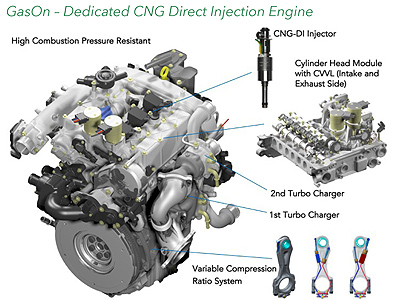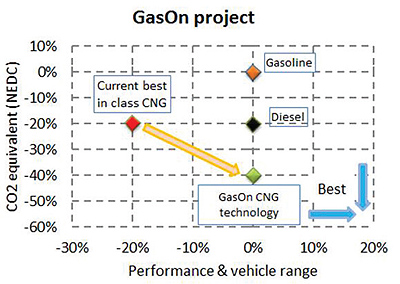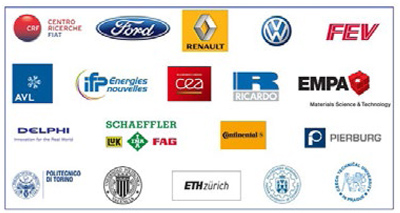 Transport at present consumes one third of all energy used within the EU and generates one quarter of the greenhouse gas (GHG) emissions. Also the demand to reduce air pollution due to transportation vehicles in urban areas becomes stronger, especially taking into account that the GHG emissions from transport are expected to constitute a larger share of the overall EU GHG emissions, up to over 40% in 2050, thereby also becoming the dominant sector in terms of GHG emissions. In this context, a strong de-carbonisation process has been launched to drive the European transport sector to the 2050 target and the use of Low Carbon Alternative fuels, like Natural Gas, will play a fundamental role to accelerate this process. Today, for customers, Natural Gas (NG) vehicles are attractive mainly because of the low fuel costs. On the other hand, the high acquisition costs, reduced driving range, and the insufficient filling station infrastructure are regarded as obstacles. In this context, the “GasOn” project, funded by the Horizon 2020 EU Research and Innovation programme, aims to develop advanced CNG only, mono-fuel engines able to comply with the 2025-2030 CO2 emission targets, claiming the 20% CO2 emission reduction with regard to current best in class CNG vehicle segment by segment, and to guarantee a low fuel consumption even in real driving conditions.
Transport at present consumes one third of all energy used within the EU and generates one quarter of the greenhouse gas (GHG) emissions. Also the demand to reduce air pollution due to transportation vehicles in urban areas becomes stronger, especially taking into account that the GHG emissions from transport are expected to constitute a larger share of the overall EU GHG emissions, up to over 40% in 2050, thereby also becoming the dominant sector in terms of GHG emissions. In this context, a strong de-carbonisation process has been launched to drive the European transport sector to the 2050 target and the use of Low Carbon Alternative fuels, like Natural Gas, will play a fundamental role to accelerate this process. Today, for customers, Natural Gas (NG) vehicles are attractive mainly because of the low fuel costs. On the other hand, the high acquisition costs, reduced driving range, and the insufficient filling station infrastructure are regarded as obstacles. In this context, the “GasOn” project, funded by the Horizon 2020 EU Research and Innovation programme, aims to develop advanced CNG only, mono-fuel engines able to comply with the 2025-2030 CO2 emission targets, claiming the 20% CO2 emission reduction with regard to current best in class CNG vehicle segment by segment, and to guarantee a low fuel consumption even in real driving conditions.
 Focusing on the engine, in order to exploit the main environmental benefits of CNG and biomethane (Natural Gas from renewable sources) enabled by low carbon content and the high knocking resistance enabled by high octane number, the way has to go over Gas-Only powered engines through the following steps, carried out in the GasOn project:
Focusing on the engine, in order to exploit the main environmental benefits of CNG and biomethane (Natural Gas from renewable sources) enabled by low carbon content and the high knocking resistance enabled by high octane number, the way has to go over Gas-Only powered engines through the following steps, carried out in the GasOn project:
- The implementation of CNG Direct Injection (DI) as first important step to much more efficient gas vehicles. The Direct Injection is a key step to CNG performance equivalent to gasoline, moving to a full integration of advanced technologies.
- The development of a new lean burn concept, a new step to producing highly efficient gas-only engines. Non-DI CNG Lean Burn combustion process, based on a Diesel engine, will fundamentally gain additional benefits related to the further development of DI CNG engines.
- The development of Advanced Boosting system to optimize the engine combustion.
- The development of a sensor to detect gas quality and composition, a helpful tool for all gas vehicles to improve efficiency. The measurement of the methane number and the caloric value allow adjusting the ignition timing to operate the engine close to the knock line and to optimise injection strategy and boost pressure.
- The driving range of at least 600 km achievable thanks to the development of advanced solution for the compressed gas storage system.
 The consortium of the EU GasOn project strongly believes that Natural Gas / BioMethane has the potential to play a major role as an automotive transportation fuel for future passenger cars, trucks and buses, since methane is an environmentally friendly energy carrier which can easily be produced by different sustainable pathways.
The consortium of the EU GasOn project strongly believes that Natural Gas / BioMethane has the potential to play a major role as an automotive transportation fuel for future passenger cars, trucks and buses, since methane is an environmentally friendly energy carrier which can easily be produced by different sustainable pathways.
Contact details:
Email: massimo.ferrera@crf.it
Website: www.gason.eu